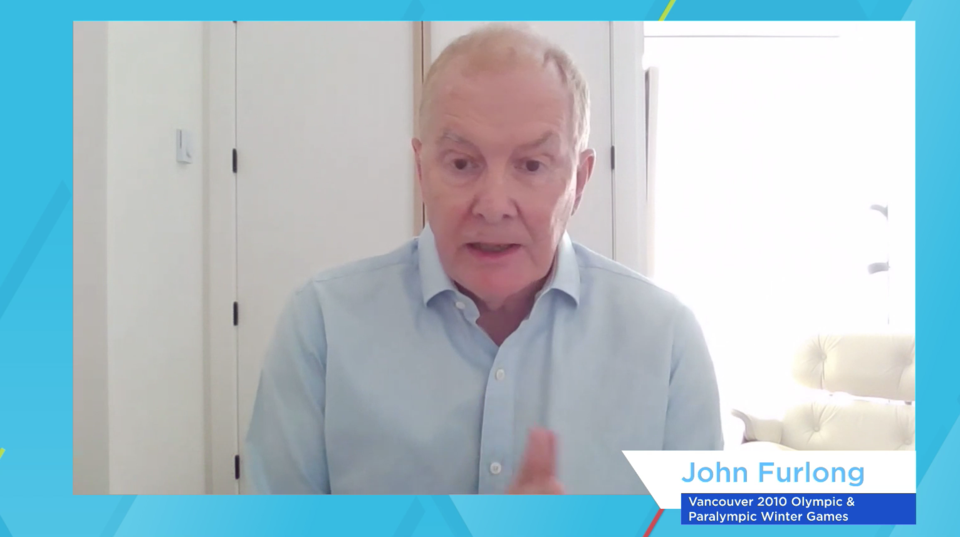Whistler’s mayor joined a host of B.C. leaders who laid out their vision for a 2030 Winter Olympic bid that could help the province’s struggling tourism economy recover post-pandemic.
Mayor Jack Crompton was part of a virtual panel on Friday, April 16 hosted by the Greater Vancouver Board of Trade that explored the possibility of a regionally focused Winter Games that would rely on existing facilities to create what 2010 Vancouver Olympic Organizing Committee (VANOC) president John Furlong said could be the most cost-efficient Games in history.
“I think I’d prefer if it was the Whistler 2030 Games, but I think B.C. 2030 makes a lot of sense,” Crompton said during the panel. “One of the most important things for me is the conversation that would need to happen with our community, and when I talk to people around town, there’s a lot of excitement.”
At the root of a B.C. bid is the idea that no taxpayer money would be used for venue construction, instead utilizing 2010 Olympic legacy facilities in Vancouver and Whistler, as well as existing venues in communities across B.C.
Furlong envisioned “as many as eight or nine” host communities taking part.
“We have what we need, indeed more than what we need,” he said. “So the vision for 2030 is a radical shift away from what was used in terms of cost structure and the scope is very different.”
A B.C.-wide Games could also serve as a much-needed boon for a tourism sector that is likely to feel the effects of the COVID-19 pandemic for years to come.
“But how do you invest to get back to a different future going forward?” asked Tourism Vancouver president Royce Chwin. “Something like the Games, the dollars involved, provide a catalyst for that and provides a media platform that we would never be able to afford that would have Vancouver, the rest of British Columbia, and Canada in the conversation, where the world would be looking in as we work towards those Games. I like what that does for the opportunity to rebuild and restart the sector.”
There’s also ample opportunity to build on the momentum of 2010 for Indigenous tourism, which had been enjoying significant growth until the pandemic hit, said Brenda Baptiste, chair of Indigenous Tourism BC.
“[The 2010 Games] really brought out the importance of Indigenous tourism, and the importance of us making a decision about what we’re going to share within our culture, what we’re going to highlight and share with our visitors and what we’re going to protect as sacred to our nations. It brought that forward but it also showcased to our visitors that there’s a deeper meaningful connection that we can have with our visitors,” she said. “[Indigenous tourism] has actually grown 20 per cent per year since the 2010 Olympics, and certainly we’ve had major opportunities in terms of economic development that hasn’t had an impact on the economic growth of this province, and I believe that the 2030 Olympics will continue to build on that success.”
Relying so heavily on private funding doesn’t exclude the potential for government investment into social and infrastructural projects in the lead-up to the Games, noted Jane Bird of Bennett Jones LLP, pointing to legacy housing and the construction of Vancouver’s Canada Line as an important consequence of the 2010 Olympics.
“There’s nothing like an event to bring it crystal clear and to get the broader community focused on what matters to them and what is less important. It’s kind of like having a work-back plan,” she said. “I think the power of a shared goal, and as unsexy as it sounds, a shared work-back plan is hard to overestimate. It just makes real the initiatives that sometimes have a tendency to drift.”
Crompton pointed to the affordable housing initially built for the Athlete’s Village in Cheakamus Crossing as one of the 2010 Games’ “biggest legacies” for Whistler, and wants any future bid including Whistler to have a similar spinoff effect.
“I don’t see any massive chasm that can’t be crossed aside from community buy-in and I think that’s the most critical piece to this, and we will learn a lot in that conversation,” he said. “For me, Indigenous communities and the host nations need to be on board, and we need to be tackling the issues that we have today: climate, housing, and affordability for our whole region.”


